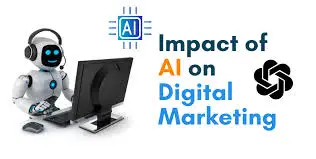Introduction
The digital marketing landscape is evolving rapidly, and AI in digital marketing has emerged as a game-changer. From automating repetitive tasks to delivering hyper-personalized customer experiences, artificial intelligence (AI) is reshaping how brands connect with audiences. In this article, we’ll explore the role of AI in digital marketing, its applications, benefits, and how businesses can leverage it to stay competitive.
1. What is AI in Digital Marketing?
AI in digital marketing refers to the use of machine learning algorithms, natural language processing (NLP), and data analytics to optimize campaigns, predict trends, and enhance customer engagement. Unlike traditional methods, AI-powered tools analyze vast datasets in real time, enabling marketers to make data-driven decisions.
Key Applications:
- Predictive Analytics: Forecast customer behavior and campaign performance.
- Chatbots: Deliver 24/7 customer support via platforms like Drift or Intercom.
- Content Creation: Tools like Jasper.ai generate SEO-friendly blogs and social media posts.
- Ad Optimization: Platforms like Google Ads use AI to automate bidding and targeting.
2. Benefits of AI in DM
a) Hyper-Personalization
AI analyzes user data (e.g., browsing history, demographics) to create tailored content. For example, Netflix uses AI to recommend shows, while Amazon suggests products based on past purchases.
b) Improved ROI
By automating A/B testing and optimizing ad spend, AI in DM reduces wasted budgets. Marketers report up to 30% higher ROI with AI-driven campaigns.
c) Enhanced Customer Insights
AI tools like HubSpot or Salesforce Einstein uncover hidden patterns in customer data, helping brands refine their strategies.
3. AI-Powered Tools Transforming the Industry
Here are five tools leveraging AI in DM:
| Tool | Function |
|---|---|
| ChatGPT | Generate content, ad copy, and emails. |
| SurferSEO | AI-driven SEO audits and recommendations. |
| Canva Magic Design | Create visuals using AI templates. |
| AdRoll | Automate retargeting campaigns. |
| Crayon | Track competitor strategies in real time. |
4. AI in Digital Marketing: Feature Images Best Practices
Visuals are critical for engagement. Here’s how to optimize feature images with AI:
a) AI-Generated Images
Tools like MidJourney or DALL-E create custom visuals for blogs, ads, or social media. For example, an AI-generated infographic about “AI in digital marketing trends” can boost shares.
b) Image SEO
- File Names: Use keywords like
ai-digital-marketing-tools.jpg. - Alt Text: Write descriptive tags (e.g., “AI analyzing marketing data”).
- Compression: Use AI tools like ShortPixel to reduce file size without losing quality.
c) A/B Testing Visuals
Platforms like Optimizely use AI to test which images drive higher CTRs (click-through rates).
5. Challenges of Implementing AI in Digital Marketing
While AI in digital marketing offers immense potential, brands face hurdles:
a) Data Privacy Concerns
Collecting customer data for AI analysis must comply with GDPR and CCPA regulations.
b) High Initial Costs
Advanced AI tools require significant investment in software and training.
c) Over-Reliance on Automation
AI lacks human creativity. Balance automation with human oversight for authentic campaigns.
6. Future Trends: AI in Digital Marketing
a) Voice Search Optimization
With voice assistants like Alexa, optimizing for conversational queries will be critical.
b) AI-Driven Video Marketing
Tools like Synthesia create videos with AI avatars, reducing production costs.
c) Ethical AI
Transparency in AI decision-making will build consumer trust.
7. How to Integrate AI into Your Digital Marketing Strategy
- Audit Existing Tools: Identify gaps AI can fill (e.g., chatbots for support).
- Start Small: Pilot AI tools for email marketing or social media.
- Train Your Team: Upskill employees on platforms like Google Analytics 4.
- Measure Results: Track KPIs like conversion rates and customer retention.
Conclusion
AI in digital marketing is no longer a luxury—it’s a necessity. By automating tasks, personalizing experiences, and unlocking actionable insights, AI empowers brands to stay ahead in a crowded marketplace. While challenges like data privacy and costs exist, the long-term benefits far outweigh the risks. Start integrating AI tools today to future-proof your strategy.
